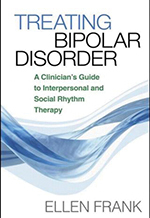Via Scoop.it – Healthcare Continuing Education

This 6-hour CE course presents a powerful approach for helping people manage bipolar illness and protect against the recurrence of manic or depressive episodes. Interpersonal and social rhythm therapy focuses on stabilizing moods by improving medication adherence, building coping skills and relationship satisfaction, and shoring up the regularity of daily rhythms or routines. Each phase of this flexible, evidence-based treatment is vividly detailed, from screening, assessment, and case conceptualization through acute therapy, maintenance treatment, and periodic booster sessions. Among the special features are reproducible assessment tools and a chapter on how to overcome specific treatment challenges. Guilford | 2005 | 212 pages | Course #60-69
Show original
Like this:
Like Loading...





